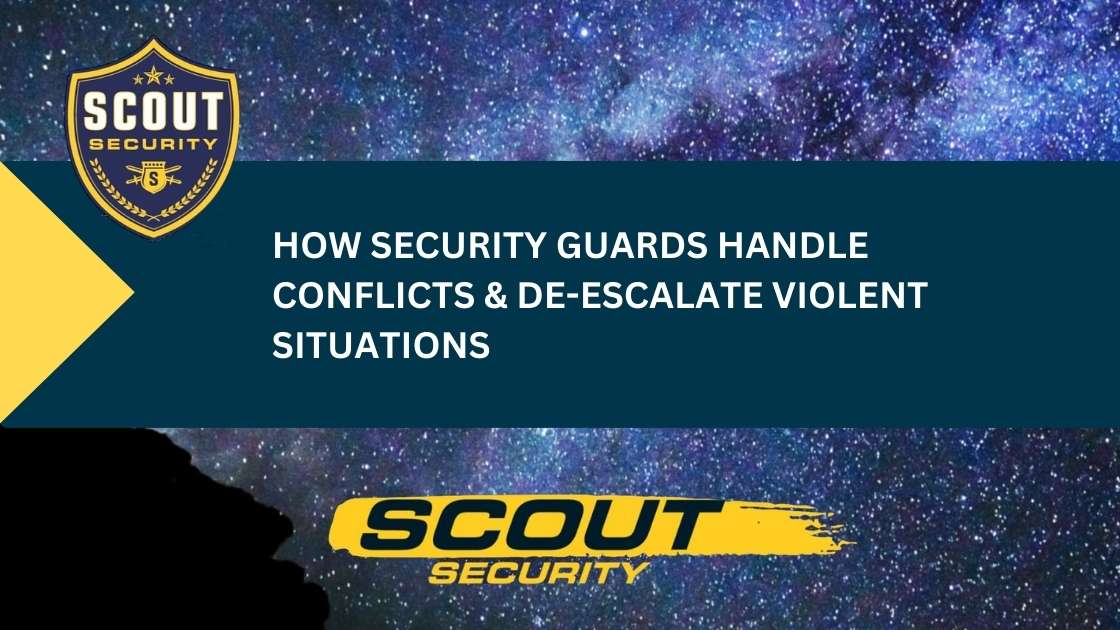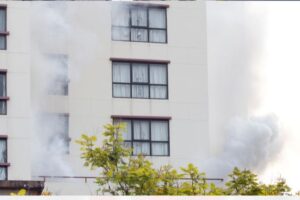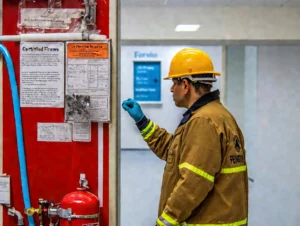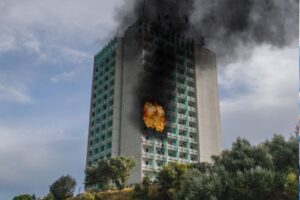Security guards undergo de-escalation training that involves active listening, empathy, and calmness to diffuse potentially violent situations between your employees, guests, or other aggressive people on your premises.
Aside from deterring crimes through constant patrols and rapid response to emergencies on your property, security guards also use effective conflict resolution to maintain order and public safety on your premises. Whether it is in residential, commercial, or industrial settings, they can handle any of your security concerns.
Their versatility in handling various security threats from workplace violence to serious criminal activities is what makes them irreplaceable parts of your security plan.
Scout Security’s private security guards and mobile patrollers are trained in conflict de-escalation aside from risk assessment and emergency response to give you all-around protection. We serve clients in the Colorado Springs and Denver Metro areas. Book a consultation now!
Warning Signs of Escalation: How Security Guards Can Determine When a Situation Will Escalate
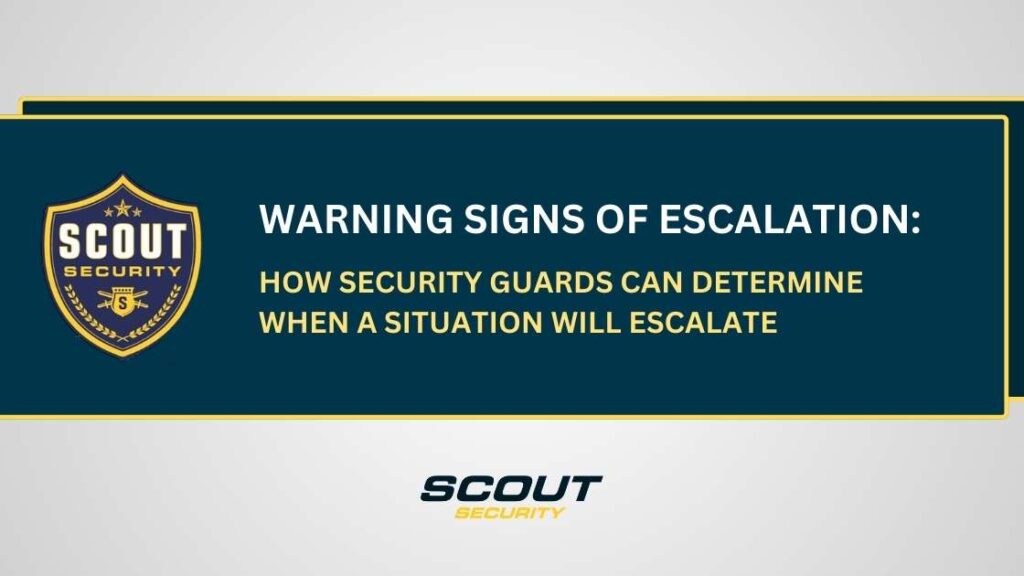
Security guards have a high risk of encountering potentially dangerous situations due to the nature of their work. For them to fulfill their role of ensuring the safety of your people, customers, and property, they need to have a high level of situational awareness.
This allows them to identify signs of a tense situation and intervene before it escalates and leads to violent incidents.
Predicting a person’s reaction in any given scenario can be a challenge, but security guards can determine potentially violent situations through certain indicators such as the following:
- Loud talking
- Pacing
- Heavy breathing
- Flushed complexion
- Nose flaring
- Making fists
- Finger-pointing
- Speaking in a raised voice
- Avoiding eye contact
- Angry facial expressions
- A high tone of voice
- Stiffening shoulders
- Kicking or punching inanimate objects
- Laughing, yelling, and other inappropriate reactions
- Invading someone’s personal space
- Using offensive or violent language
- Making direct or explicit threats
- Bragging about previous aggressive incidents
- Tense body language
Also Read: Conflict De-escalation: How Security Guards Prevent Workplace Violence
What is the Role of Security Guards in Conflict Resolution?
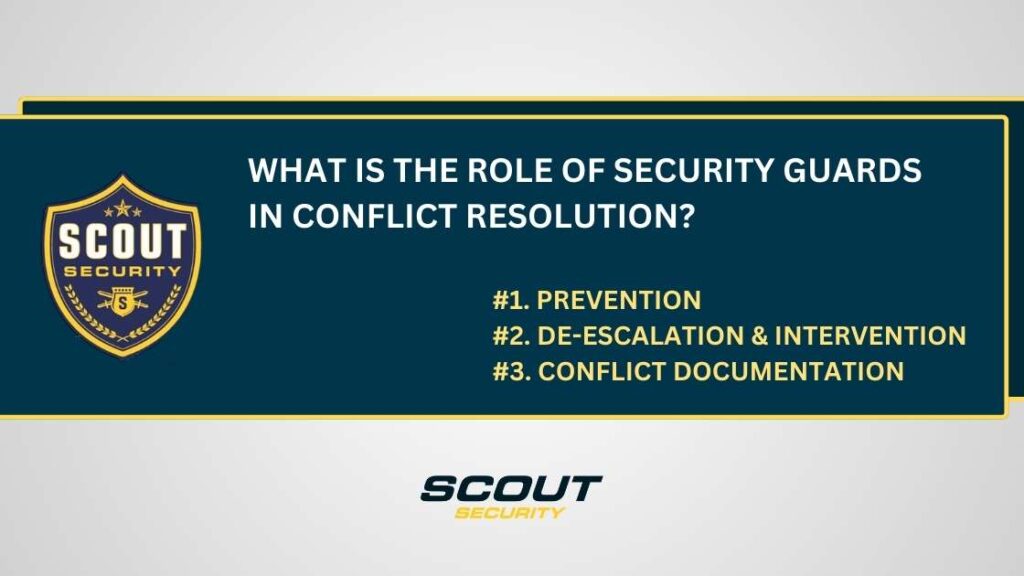
Before we proceed to the conflict de-escalation techniques employed by security guards in controlling tense situations, let us first give you an overview of their role in conflict resolution:
#1. Prevention
Security guards can prevent conflicts in your business by constantly scanning their surroundings for any security threats or early signs of conflict to prevent escalation.
As mentioned previously, security guards need a keen sense of awareness to prevent conflicts in the first place. They do this by:
- Actively identifying possible conflict triggers
- Monitoring areas at risk
- Ensuring the compliance of your employees and guests with your company policies
Moreover, they approach individuals who appear distressed or behave unusually with a friendly demeanor to understand and address their concerns. Thus, preventing potential conflicts from arising.
Also Read: 10 Benefits of Hiring a Security Guard to Protect Your Business
#2. De-escalation & Intervention
In case the tense situation does turn into a conflict, security guards will use their training in communication techniques to diffuse the tension peacefully. (More on this later)
Security guards will also separate the two parties to ensure their safety for conflicts involving two individuals that can’t be resolved through de-escalation.
#3. Conflict Documentation
Security guards meticulously record every aspect of any security threat they are involved in, including conflict incidents, in case of potential investigations, lawsuits, and other legal matters.
On-site guards will create detailed incident documentation and report of the conflict that includes:
- Date and time
- Location
- Names of involved parties
- Witnesses
- Actions taken
- Verbal exchanges
- Resolution
In addition, the guards will take photographs or videos of the following for visual evidence:
- Scene
- People involved
- Any injuries
- Damages
Security guards will also report the incident promptly to supervisors and property managers to comply with security protocols.
Also Read: 12 Top Duties & Responsibilities of a Security Guard
7 Conflict Resolution Techniques: Ways Security Guards De-escalate Tense Situations
Security guards handle conflict and potentially dangerous situations through thorough preparation including the development of a clear plan based on their past experiences and consistent training.
This preparation includes:
- Knowing when to call for backup
- When physical force may be necessary
- How to effectively communicate under pressure
- Avoiding aggressive confrontations that could escalate the tension and put other people at risk
Among the techniques that security guards can follow to calmly ease tensions and promote harmony within your business include the following:
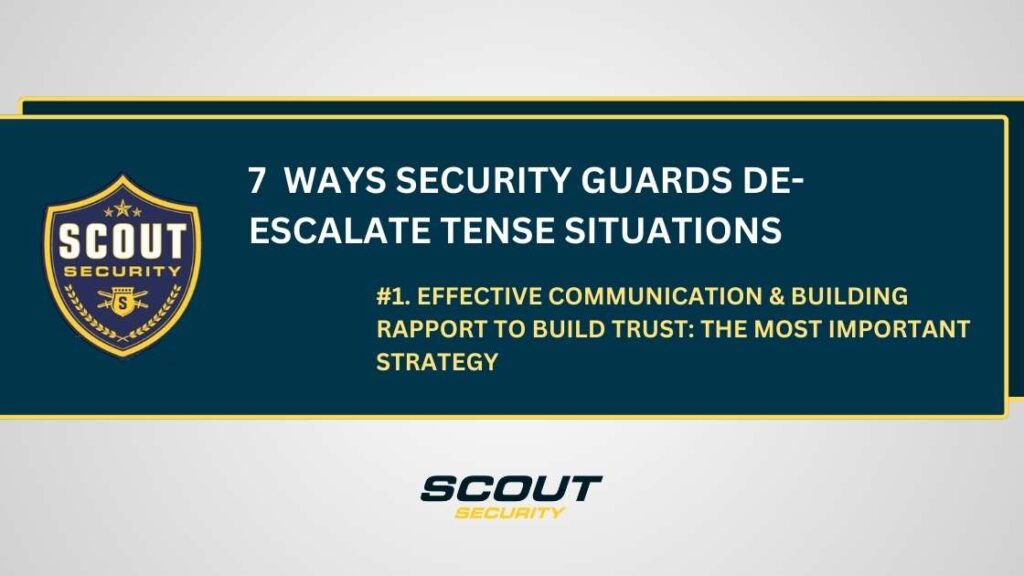
#1. Effective Communication & Building Rapport to Build Trust: The Most Important Strategy
Security guards build trust, which is important in any conflict resolution, through effective communication and maintain that trust once established.
They build rapport to help in understanding the root causes of the issue and encourage constructive dialogue by:
- Maintaining a calm and friendly demeanor
- Using clear and non-confrontational language
- Finding common ground
- Deflecting insults and changing the topic by asking open-ended questions
- Practicing active listening and empathy (more on this later)
- Using respectful terms to address the person
- Recognizing the person’s emotions and situation
- Avoiding provocative or judgemental language including emphasizing words that might negatively impact the situation
- Avoiding ultimatums, threats, and unnecessary gestures or physical contact that the person may perceive as aggressive
- Not focusing on the angry person’s violent behavior (e.g. telling an angry person to not be angry can make them angrier) but on their positive aspects instead
- Knowing when to make an apology to resolve the angry person’s grievances
Also Read: How to Hire a Security Guard: 7 Factors to Consider & More
The Importance of Non-Verbal Cues & Body Language in Effective Communication to De-escalate Tensions
Non-verbal cues and body language are crucial in effective communication, especially in tense situations.
Aside from choosing the right words, security guards should know how to deliver them in a way that won’t escalate the conflict. They must stay aware of their body language and tone of voice so they won’t appear hostile or confrontational to avoid upsetting the person further.
For instance, Scout Security’s guards will steer clear of judgmental language, threats, or aggressive physical gestures to lower the tension effectively. They are trained to control their tone, volume, rate of speech, and facial expressions.
Providing Choices to the Angry Person to Make Them Follow Commands Voluntarily
In tense situations involving angry individuals, demanding compliance can further lead to resistance. This makes offering choices an effective strategy rather than giving direct commands because it engages the person’s sense of autonomy. Thus, eliminating combative responses and making the person more inclined to cooperate without feeling coerced.
For instance, security guards can suggest or ask questions to provide the person with a choice to cooperate such as “Would you feel more comfortable talking to a different officer?” instead of “Will you talk to me?”.
Also Read: How Can Uniformed Security Guards Deter Crime in Your Business?
Apologizing as an Effective De-escalation Technique
Security guards may also apologize to demonstrate respect and empathy as well as acknowledge that a mistake or offense may have occurred to reduce the other person’s hostility.
By showing humility and taking accountability, guards can build and maintain trust.
For instance, even well-versed guards in de-escalation might unintentionally escalate the situation which makes it crucial to recognize such moments and apologize.
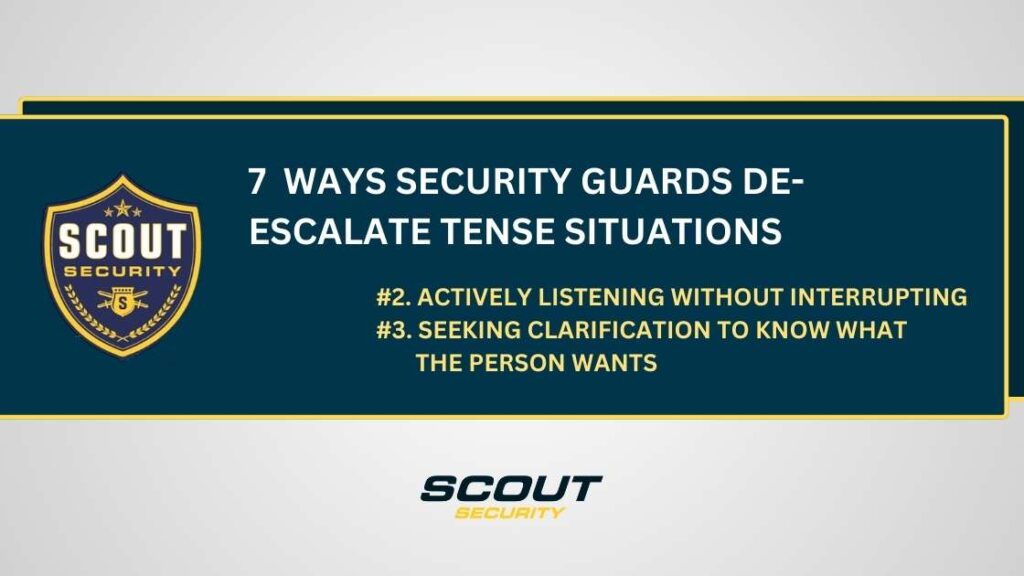
#2. Actively Listening Without Interrupting
Through active listening, security guards allow tense individuals to express their frustrations and feel heard.
Aggressive people often seek to be heard and understood. Thus, guards will give agitated people space to vent to help cool down the situation and prevent conflicts.
They will also maintain eye contact, nod, and ask clarifying questions without interrupting, correcting, or arguing with them to make the person feel valued and genuinely heard.
Also Read: 15 Top Qualities of a Good Security Guard: Skills to Look For
#3. Seeking Clarification to Know What the Person Wants
Angry individuals often struggle to articulate their thoughts clearly which makes seeking clarification important to understand the person more.
Security guards ask targeted questions or paraphrase and repeat the person’s statements to understand their point of view and help them clarify their own thoughts. This can also make the person realize their behavior and consider their actions.
Examples of clarifying questions that guards may ask to get more details include:
- Asking what the person meant by their previous statement
- Asking for an example to explain what the person meant further
- Restating what the person said (e.g. “Let me see if I got this right…”)
Moreover, inquiring about the person’s expectations or desires can help pinpoint their needs and encourage a more effective resolution. It includes asking questions like “What can we do to make you happy?”. This also avoids misunderstandings and confusion.
Also Read: 15 Different Types of Security Guards & What They Do: A Guide for Property Managers
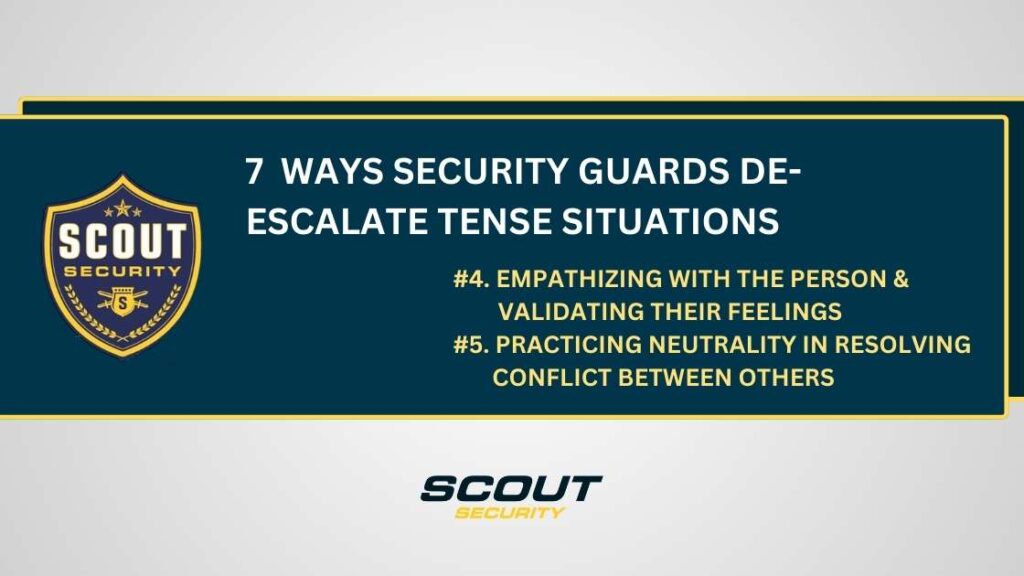
#4. Empathizing With the Person & Validating Their Feelings
Security guards practice empathy – the ability to understand and share the feelings of another – to connect with the tense person and show respect. This can help reduce the defensiveness and emotional intensity of the person involved.
Empathy involves acknowledging the person’s emotions and perspectives as well as addressing their specific needs without judgment. This is another way to make the person feel heard, understood, and less isolated.
Also, recognizing the person’s feelings (whether it is anger, fear, or frustration) can help build rapport and trust.
Security guards can use the following example phrases to empathize with the person and validate their emotions:
- “I can’t imagine how hard this is for you.”
- “It’s understandable that you would feel disappointed by this.”
Also Read: Proprietary Security vs Contract Security Companies: Which Suits Your Business Best?
#5. Practicing Neutrality in Resolving Conflict Between Others
Guards can act as neutral mediators to avoid misunderstandings and de-escalate tensions. They can facilitate discussions to identify and address the root causes of the conflict as well as guide both parties towards a collaborative and practical solution.
Security guards maintain an impartial stance without displaying favoritism to achieve fair outcomes. They avoid making premature conclusions, especially when they are not fully informed about the incident.
They will first understand the perspectives of all parties involved by talking to each one separately through open-ended conversations. This approach will help keep both parties calm and encourage them to share more details about their disagreement. Thus, helping create a more informed and balanced conflict resolution process.
Also Read: Security Guards vs. Police Officers: Key Differences & Similarities
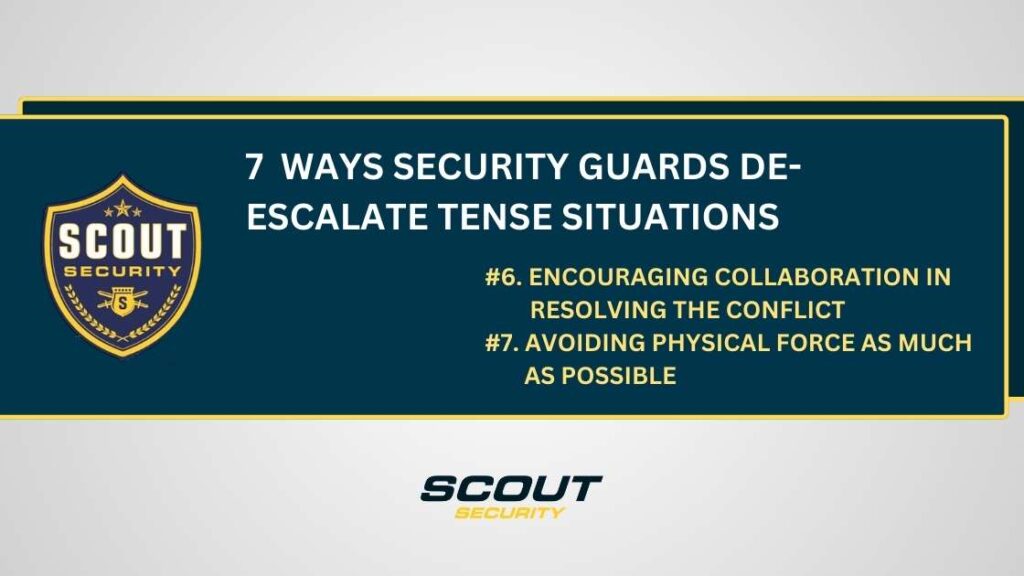
#6. Encouraging Collaboration in Resolving the Conflict
Security guards prioritize cooperation to de-escalate conflicts.
They avoid quick judgments as much as possible and focus instead on finding mutual understanding and peaceful solutions.
They demonstrate openness to collaboration, propose mutually acceptable solutions, and steer situations toward win-win outcomes to eliminate resistance.
#7. Avoiding Physical Force as Much as Possible
The main reason why security guards are trained to use de-escalation strategies is to avoid physical force when handling conflicts.
In fact, security guards are forbidden to use unnecessary force and must follow applicable laws in case it is really necessary. In situations where the conflict has become out of the guard’s control, they may involve the police to handle the incident legally.
Also Read: Security Guard Legal Powers: What They Can and Can’t Do
Other Key Things to Know About Security Guards and Conflict De-escalation
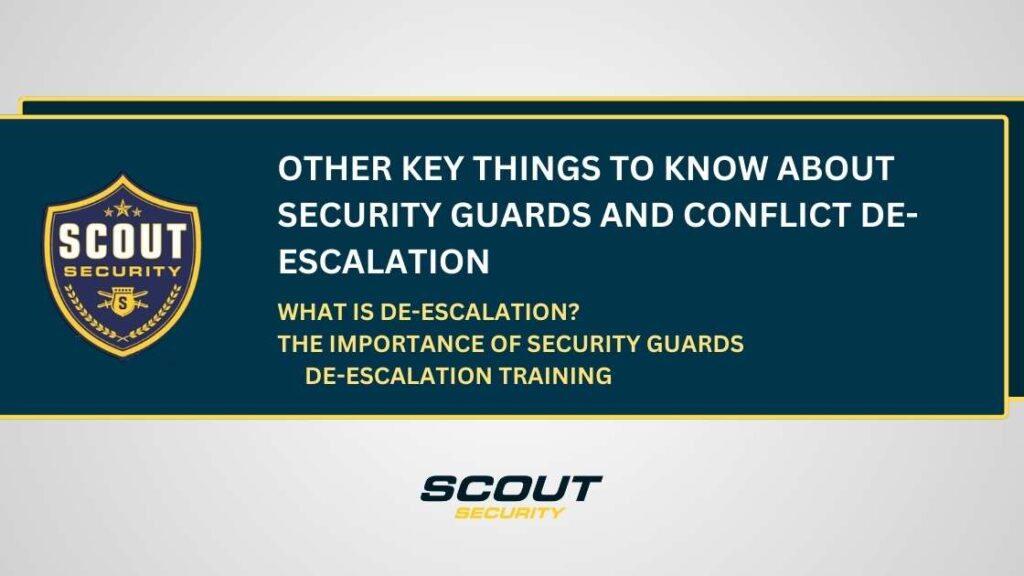
What is De-escalation?
Below is how the U.S. Department of Homeland Security defined de-escalation:
“The use of communication or other techniques during an encounter to stabilize, slow, or reduce the intensity of a potentially violent situation without using physical force, or with a reduction in force.”
The Importance of Security Guards De-escalation Training
De-escalation training is important in avoiding potentially horrific endings. It equips security guards with effective strategies to handle tense situations by calming individuals and avoiding violence.
This helps maintain the safety of the people involved, other people around, and the security guards themselves by prioritizing peaceful methods over physical force to reduce the risk of harm.
Specific Benefits of Effective Conflict Resolution
- Enhanced workplace security by reducing the likelihood of violence and minimizing the risk of violence
- Improved employee confidence to boost productivity and reduce downtime
- Healthier relationships among your employees and patrons
- Improved company reputation and trustworthiness
- Effective mitigation of legal risks
- Minimized property damage and physical injuries
Also Read:
- When Should You Hire Short-Term or Temporary Security Guards?
- Why Private Security and Law Enforcement Collaboration is Crucial
- The Role of Security Guards in Emergency Response
- 6 Advantages of Having a Hybrid Security Strategy
FAQs
Security guards use effective communication, active listening, empathy, and non-verbal cues to de-escalate situations.
They build trust and rapport, offer choices, and apologize if necessary to reduce tensions without physical force. They also document incidents thoroughly in case of legal matters and act as neutral mediators to encourage solutions that satisfy all parties involved.
Security guards listen actively and empathize with angry individuals to make them feel valued and understood as well as validate their emotions to reduce tensions. They focus on peaceful resolutions through calm communication and avoid using language and gestures that might escalate the situation.
Hire Scout Security’s Licensed & Insured Security Guards to Ensure Effective Conflict De-escalation in Your Workplace
Scout Security’s certified security guards and mobile patrollers in the Denver Metro and Colorado Springs areas are highly trained in various security strategies and laws. De-escalation training is among our top focus training programs to help protect your reputation by handling conflicts legally and professionally which also prevents potential liabilities.
Thus, we can give you peace of mind that your business is not only crime-free but also maintains a safe and harmonious environment for your employees and customers. Contact our experts now to know how our comprehensive security services can help you!

